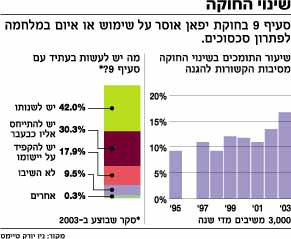For the first time in three generations, public opinion is undergoing a shift in relation to the pacifist constitution, among other things due to the fear of the North Korean threat

Tokyo. Until recently, Nishuhachi Yudo - the author of a plan for Japan's nuclear armament over four years - was part of the eccentric fringes; A man whose ideas were so far removed from mainstream pacifism that his articles were only published in anonymous journals.
Today, however, he has a personal show on a major Tokyo radio station and is a sought-after speaker on college campuses. In a situation where everyone - from the academic establishment to Prime Minister Junichiro Koizumi - supports the idea that Japan should be more assertive militarily, judo is no longer seen as an exception.
More than half a century after two atomic bombs forced Japan to surrender in World War II, the topic of nuclear armament - which for years was one of the most sacred taboos in the country - illustrates Japan's dealings with a new challenge: how to become what is called here a "normal country", one that can manage wars
Not all Japanese support nuclear disarmament. But the world has changed since Japan adopted the constitution written for it by the US after the end of the war and which prohibits the use of force in settling international disputes. The question now is, can Japan also change?
One of the issues that is expected to have a huge impact on the entire region is how Japan will choose to deal with the need to defend itself after the trauma it and its neighbors experienced in the twentieth century. In the long years of prosperity that followed the war, there were two main sources of Japan's sense of security: the protection of the United States, which still stations 47 soldiers here, and economic strength that allowed Japan to buy a way out of almost any unpleasant situation. Today, heavy doubts are cast on these two elements.
On Saturday, Japan took a historic step, after parliament approved a controversial law to send Japanese troops to support American forces in Iraq. Since World War II, Japan has not deployed troops outside the country's borders outside of a UN mandate. No Japanese soldier has participated in battle since 1945, and none of them have been killed in battle, because they have always been limited to low-risk activities in safe areas. However, according to the new law, a thousand soldiers will be sent to a conflict zone, and instead of serving as a neutral force, the Japanese soldiers will join an occupying army led by the US, which seeks to subdue a guerrilla war.
Polls show that about half of the public opposes the deployment in Iraq. Still, for the first time in three generations, Japanese public opinion has undergone a turnaround, and the idea of becoming more assertive militarily is increasingly accepted. The defenders of the "Peace Constitution" moved to the defensive side.
While China's growing military power worries many, the main cause of this shift is the worsening of tensions with North Korea, which is already armed with ballistic missiles and is working to develop nuclear weapons. In March, Japanese Defense Minister Shigeru Eishiva told a parliamentary committee that if North Korea started refueling its missiles, "the time has come to act."
But even if the Japanese feel better about the new decisiveness, it is very possible that their neighbors will not share this feeling. Even today, many of Japan's neighbors are suspicious of it and believe that it still does not fully recognize the damage caused by its militarization in the last century, and has not atoned for its colonial past. In almost every ranking, Japan and China are placed among the five countries with the largest defense budgets. Commentators warn of the dangers of military competition in the region, which could also involve North Korea.
According to the commentators, in an era of increased US security missions in other parts of the world following the September 11 attacks, the Americans may be tired of carrying the security burden in this region. Some cite as proof of this the US decision to reduce the number of its troops stationed in South Korea.
At the same time, the emergence of economic problems in Japan revealed the limitations of the approach that dominated the country's foreign policy in recent years - dispersing funds around the world in order to win the sympathy of all parties. But commentators say the days of "cashing out the checks" diplomacy are passing. Last year, Japan gave way to the USA at the top of the list of countries contributing to international aid. Its aid budget was cut by 10% and the national debt skyrocketed to 140% of GNP. All of these increase the resistance to international donations.
Some argue that investing in nuclear weapons is an expensive solution, which may cost more than spending on international aid. The difference is that investing in the military at least leaves something in Japan's hands and instills a sense of security - which in politics is sometimes everything. Investing in the military can also create jobs for the benefit of the economy.
These changes are also reflected from a practical point of view in Japan's arsenal, which until now was limited to self-defense purposes. It recently purchased systems that enable aerial refueling for aircraft and developed a sophisticated air support system that is half destroyer and half helicopter carrier. According to commentators, the system was designed to enable military operations in Korea. These kinds of measures have won great sympathy among the Japanese public.
https://www.hayadan.org.il/BuildaGate4/general2/data_card.php?Cat=~~~594490497~~~26&SiteName=hayadan
